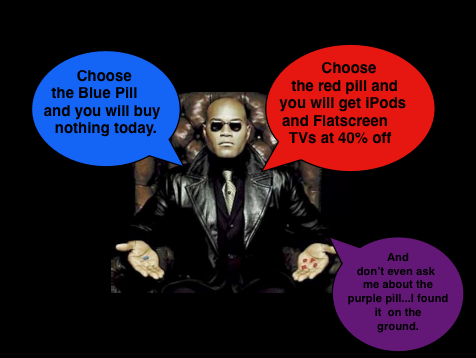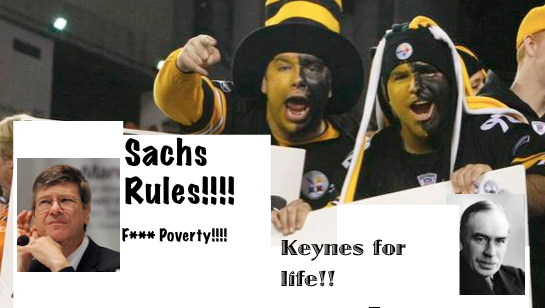Facebook and Twitter are conflicted today. On the one side we have people are talking about all the stuff they are scoring for Black Friday. Over the fence, down the stairs, into the sublet, we have everyone else calling today Buy Nothing Day. So what’s with today, today? Is it Black Friday or Buy Nothing Day? It’s become a real red pill-blue pill moment.
I hope my getting rid of most of what I own twice in the last five years qualifies me to call myself not very materialistic. But you still won’t find me hash tagging #BuyNothingDay on the Twitter wires. I feel like, yeah, if you’re going to buy Nikes or flatscreens, today’s probably a good day for it. Go for the sales. Aren’t most of the lovely people out there buying gifts anyways?
It’s true recyclers, Black Friday is the day when consumers consume and CEOs of retail chains calculate how much their board will allow them to bonus. But most things, even consumerism and Canada, get to have their own day. Being vehemently against what free people decide to do with their own time and money on Black Friday, seems to me, like encouraging everyone to call Christmas “Do Nothing Christmassy Day” just because you don’t celebrate it.
So even though the thought of going into a mall fills me with naked-in-public type panic, I’m not out to rain on anyone’s Black Friday Parade. As it was, I didn’t buy anything today, but that’s just because I tend to buy gifts that are not discounted on Black Friday–like sentimentally old books, eccentric baubles, mix CDs, alligators, adult diapers, (the same kind of gifts that make people smile and hug you, but eventually make their way to the attic or garbage).
Not feeling like an advocate for buy or not buy, but still wanting to post something Black Friday-ey, I decided to write about my favorite economist, Jeffrey Sachs. I know having a “favorite economist” makes me sound as exciting as a linear equation, but Jeffrey Sachs is hip to the bone. Seriously. He’s like, the Indiana Jones of economics.
His book, The End of Poverty, led me to some insightful discoveries. That’s a neutral way of saying I was misinformed and downright wrong in much of my understanding of macro economics and how it relates to poverty. I got my first lessons on the subject in the trenches, when I was working in development in Guatemala. From that micro view, it was easy to adopt the perspective that poverty persists because the rich take more than their fair share. This view is a simplistic and mostly wrong.
Sachs points out that “Technology has been the main force behind the long-term increases in income in the rich world, not exploitation of the poor.” This view was hard to swallow during much of my time working with the poor in Guatemala, a country where exploitation of the poor exists at higher levels than most elsewhere.
The End of Poverty was written as a manual for how to practically achieve the UN’s Millenium Goals that endeavor to cut extreme poverty in half by 2015. Saches goes further in his book and suggests a path to eradicating extreme poverty completely by 2025.
Bold? Yes. Impossible? Not.
It’s an encouraging book with plenty of passages for pause like, “Two hundred years ago the idea that we could potentially achieve the end of extreme poverty would have been unimaginable.”
One of the biggest take homes from the book is that capitalistic development in foreign markets has led to giant leaps in economies of many of the world’s third world countries. It quells the fear that economic leaps in pantingly paced countries like China and India will lead to decline in the West:
“These fears are fundamentally wrong, and, even worse, dangerous. They are wrong because the world is not a zero-sum game struggle in which one country’s gain is another’s loss, but is rather a positive-sum opportunity in which improving technologies and skills can raise living standards around the world.
So if we want to get ahead, we best keep track of Abel and not murder him because God liked his tomatoes more.
The most jolting figure was that in 1981 there were 1.5 billion people living in extreme poverty and in 2001 there were only 1.1 billion. That 500 million drop doesn’t even account for the for the fact that the population increased by 1.6 Billion during the same time period. This is encouraging. Ridiculously encouraging and something important to keep in mind.
The book leaves a lay reader with an elementary grasp of why poverty exists and what we can do about it. Just as the figure in the previous paragraph is promising, so is the time we are living in. As Sachs says, “we as a generation, can do something dramatic to improve the world.”
I believe that. It’s hard not to after having met so volunteers hurling their every ounce of energy not chasing six figures, but instead brighter smiles or cleaner energy, or more whales, or whatever–the world is full of people choosing their battle, holding their ground, and making real differences. I’ve heard it said by several people who work with the poor, that if everyone could see poverty first hand, it would not exist. I hold this truth self-evident.
So on Black Friday, a day when, yeah, a lot of us went to the store to spend what for most us are hard-earned dollars, let’s not feel guilty. Feeling guilty about what we have has never treated malaria or fed a starving infant. Let’s feel empowered and do something with that electricity. Our time, talents, and treasure has the power to make positive differences. Period. And everyone has at least one of these three Ts lying around.
As a blog post can only go so far, this is where our look at Sachs must end. But if this was of interest, I recommend you library, borrow or buy The End of Poverty. Mel, I still have the copy you lent me. Next time I’m in London, I’ll be sure to pack it. . .






